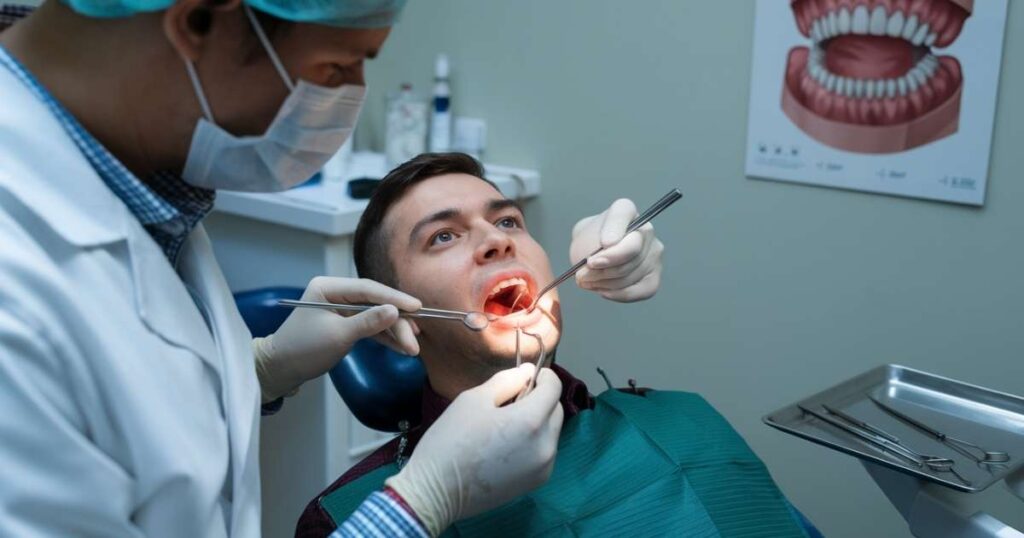Tooth extraction can be painful, but the real struggle often begins after the procedure. Whether it’s a wisdom tooth or another one, the lingering discomfort can be tough to handle. Luckily, some simple home remedies can ease the pain and help with recovery.
Struggling with that persistent ache? You’re not alone. Cold compresses, saltwater rinses, and natural remedies like clove oil can bring quick relief without needing heavy meds. Let’s explore how these easy methods can help you feel better fast.
10 Reasons for Tooth Extraction Pain
| Reason | Explanation |
| 1. Inflammation | Swelling and irritation around the extraction site can lead to significant discomfort. |
| 2. Dry Socket | When the blood clot is dislodged or doesn’t form, exposing nerves and bones, causing severe pain. |
| 3. Infection | Bacterial infection at the extraction site can lead to throbbing pain and swelling. |
| 4. Nerve Damage | Nerves in the jaw may be irritated or damaged during extraction, causing ongoing pain. |
| 5. Impacted Tooth Removal | The surgical removal of a deeply impacted tooth can cause intense pain as the area heals. |
| 6. Gum Tissue Trauma | The gums around the extracted tooth may be bruised or cut, leading to tenderness and soreness. |
| 7. Bone Fragments | Tiny bone fragments left behind can irritate the area and cause pain until they dissolve. |
| 8. Sinus Pressure | Upper tooth extractions can sometimes lead to sinus discomfort and pressure-related pain. |
| 9. Swelling and Bruising | Post-extraction swelling and bruising can intensify pain as your body heals. |
| 10. Overuse of Jaw Muscles | Keeping your mouth open for a long time during the procedure can strain jaw muscles, resulting in pain. |
Pain Relief Home Remedies

Experiencing pain after a tooth extraction can be uncomfortable, but several home remedies can help alleviate discomfort. Simple methods like using cold compresses, rinsing with saltwater, and applying natural ingredients can provide soothing relief. These remedies are easy to try and can make the healing process a bit more bearable.
Rinses
Following rinses can help you to relief pain:
Salt water rinses:
Saltwater rinses help with tooth extraction pain by reducing inflammation and cleaning the extraction site. The saline solution helps to flush out food particles and bacteria, which can prevent infection and promote healing. It also soothes the gums and reduces swelling by drawing out excess fluid.
Hydrogen peroxide rinse
Hydrogen peroxide rinses can offer relief after a tooth extraction by helping to clean the mouth and kill bacteria. This reduces the risk of infection and promotes faster healing. Make sure to dilute the hydrogen peroxide with water to prevent irritation, and use it gently to avoid discomfort.
Cold and Heat Therapy
Cold and heat therapy can offer effective relief from tooth extraction pain by targeting inflammation and blood flow. In the first 24 hours, applying a cold pack helps numb the area and reduce swelling. Afterward, using a warm compress can improve blood circulation and relax sore muscles. Alternating between cold and heat allows you to find what works best for you and supports a smoother healing process.
Ice pack
An ice pack is a simple yet effective remedy for tooth extraction pain. Applying it to the outside of your cheek can help reduce swelling and numb the area, easing discomfort. Use the ice pack in 15-20 minute intervals to avoid skin damage and get the best results.
Chamomile tea
Chamomile tea is a soothing remedy for pain after a tooth extraction. Its natural anti-inflammatory and calming properties help reduce swelling and ease discomfort. You can drink it warm or use a cooled tea bag directly on the affected area for 15 minutes to enjoy its healing benefits.
Essential Oils for Tooth Extraction Pain Relief
Tooth extraction can leave you dealing with discomfort and pain. While over-the-counter painkillers can help, many people turn to natural remedies for additional relief. Essential oils, known for their soothing and anti-inflammatory properties, can be particularly effective.
In this guide, we’ll explore several essential oils that may offer pain relief and support your healing process.
| Essential Oil | Benefits | How to Use |
| Oregano Oil | Known for its anti-inflammatory and antimicrobial properties, which can help reduce pain and prevent infection. | Dilute a few drops with a carrier oil and apply to the affected area using a cotton ball. |
| Thyme Essential Oil | Contains thymol, which has pain-relieving and antibacterial effects. | Mix a few drops with a carrier oil and gently rub it around the affected area. |
| Tea Tree Oil | Offers antiseptic and anti-inflammatory benefits, aiding in pain relief and healing. | Dilute with a carrier oil and apply to the area or use a few drops in a warm salt water rinse. |
| Clove Oil | Contains eugenol, a compound with strong pain-relieving and numbing effects. | Mix a few drops with a carrier oil and apply directly to the sore area using a cotton swab. |
Medicinal Remedies

Aspirin is a common remedy for pain relief due to its acetylsalicylic acid content, which helps reduce inflammation. To use aspirin for tooth extraction pain, dissolve a tablet in a small amount of water to create a paste. Apply this paste directly to the sore area to alleviate discomfort.
Menthol offers temporary pain relief by providing a cooling sensation that can numb the affected area. You can apply mentholated products or a menthol oil blend directly to the sore spot to experience this soothing effect.
Turmeric is well-known for its anti-inflammatory and analgesic properties, thanks to its active compound, curcumin. To use turmeric, mix turmeric powder with water or coconut oil to form a paste. Apply this paste to the sore area to help reduce pain and inflammation.
Natural Product Remedies
Honey:
Honey has natural antibacterial and anti-inflammatory properties that can soothe the extraction site and promote healing. Applying a small amount directly to the area can help reduce pain and prevent infection.
Cucumber Slices:
Cucumber slices provide a cooling effect that can ease discomfort and reduce swelling. Chilled slices placed on the affected area offer immediate relief by calming irritation.
Aloe Vera:
Aloe vera is known for its healing and anti-inflammatory effects. Applying fresh aloe vera gel to the sore area can help alleviate pain and speed up the healing process.
Onion:
Onions contain compounds with natural analgesic and anti-inflammatory properties. Applying freshly chopped onion to the affected area can help reduce pain and inflammation.
Vanilla Extract:
Vanilla extract has alcohol and antioxidants that can numb the pain and reduce inflammation. Dab a small amount onto the sore area to provide soothing relief and help manage discomfort.
Guava Leaves:
Guava leaves have anti-inflammatory and antimicrobial properties that can help soothe pain and reduce swelling. Boil the leaves in water, let the solution cool, and use it as a mouth rinse to alleviate discomfort.
Wheatgrass:
Wheatgrass is known for its healing and anti-inflammatory benefits. Swishing wheatgrass juice in your mouth can help reduce pain, promote healing, and fight bacteria around the extraction site.
Soft diet
A soft diet is essential for comfort and healing after a tooth extraction. Foods like mashed potatoes, yogurt, soups, and smoothies are gentle on the gums and easy to eat without causing additional pain or irritation. These options help ensure you get the nutrients you need while avoiding discomfort.
Avoid hard, crunchy, or sticky foods, as they can aggravate the extraction site and hinder the healing process. Soft, easily digestible foods reduce the risk of complications and help you recover more comfortably.
Also Read : lighting solutions for every home lumolog
Cautions After Tooth Extraction
- Avoid Sucking or Spitting: Refrain from sucking through straws or spitting forcefully for at least 24 hours after extraction. These actions can dislodge the blood clot and lead to a painful condition called dry socket.
- Steer Clear of Hot Foods and Beverages: For the first 24 to 48 hours, avoid consuming hot foods and drinks. Heat can dissolve the blood clot and delay healing.
- Don’t Smoke or Use Tobacco: Smoking or using tobacco products can significantly hinder the healing process and increase the risk of complications. It’s best to avoid tobacco for at least a few days after the extraction.
- Avoid Physical Activity: Limit strenuous physical activity and exercise for the first 24 to 48 hours. Increased blood pressure from exercise can cause bleeding and disrupt the healing process.
- Follow Oral Hygiene Instructions: Gently brush your teeth and avoid the extraction site to prevent irritation. Use an antibacterial mouthwash as recommended by your dentist to keep the area clean without disturbing the clot.
FAQs
How to make tooth extraction pain go away?
Use over-the-counter pain relievers, apply cold compresses, and avoid irritants like hot foods and smoking to relieve pain.
How to make tooth extraction pain go away?
Apply a cold compress to reduce swelling, take prescribed pain medication, and keep your head elevated to manage discomfort.
What is the fastest way to heal a pulled tooth?
Stick to a soft diet, maintain excellent oral hygiene, and avoid smoking to promote quicker healing.
Conclusion
Managing pain after a tooth extraction can be more comfortable with the right home remedies. Simple solutions like applying cold compresses, rinsing with salt water, and using essential oils can provide relief and support healing. By choosing remedies that work for you and following your dentist’s advice, you can ease discomfort and recover more smoothly.
Remember to prioritize gentle care for the extraction site and opt for a soft diet to avoid irritation. With these home remedies and proper care, you’ll be on your way to a quicker and more comfortable recovery.







